From a 100-day run across the country to planning Morgantown’s inaugural marathon, long-distance runner Jamie Summerlin goes to extremes to show his support for West Virginia veterans and his dedication to giving back to fellow service men and women.
By Samantha Cart
Jamie Summerlin never wears headphones when he runs.
While training for his first marathon in 2009, he was sure the only way he could get through his 18-mile training runs was to get in the zone and focus on the distraction music provided. During one such run, he got caught in a rain storm and was forced to put his electronics away. The next nine miles were the best he had ever experienced. “I realized while on this trail I had run countless times before that I had missed so much because I wasn’t paying attention,” he says. “So I took my headphones off and never put them back on. Running is a mental journey, and now I enjoy my surroundings, think through life and why I’m doing what I’m doing and take in everything around me.”
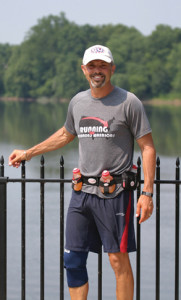
Freedom Run USA
Summerlin’s running journey has evolved from a means by which to get in shape so he can keep up with his kids to a way to support a cause that is close to his heart—veteran assistance. Co-founder of Operation Welcome Home (OWH), a veteran job placement service, Summerlin and his wife, Tiffany, are both Marine Corps veterans. “I ran my first marathon in 2009. It was really my entry into long-distance running, and I fell in love with it,” he says. “I ran a 50k six weeks later and just kept going farther and farther. I realized not only could I do this, but there are a lot of people who run to raise support or awareness for different organizations. As a military veteran, I wanted to do something to support other veterans. The existing organizations do a great job, but we all know there are gaps. I wanted to do something that supported organizations that put veterans back to work, so that’s what I did.”
His idea to raise money for veterans by running across the country—a concept born from a conversation he had with his wife—took his friends and family by surprise. “I had read books by David Horton and Marshall Ulrich about running across America, and I started meeting other people who had taken on extreme challenges,” he says. “I’m the kind of person who, if I am going to do something, I want to do it big. I also wanted to give others the opportunity to be involved and experience my journey with me.”
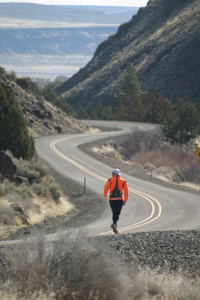
He had been running long-distance for less than two years when he realized he had the ability and need to do something with it. “My wife bought in immediately because she thought a few months later I’d be off in a different direction,” says Summerlin. “I get these wild ideas, and then before long I’m off doing something else. But when I was still training six months later, she sat down and planned it out with me. She supported me the entire way.”
Summerlin’s previous experiences in running included high school basketball and military training, but they were nothing compared to the strict schedule he created to prepare himself for running across the country. “Training for something like a marathon or long-distance run is different,” he says. “It’s not just a thing you go out and do the next day, and it’s not just physical. To me, more of it is mental. Most marathon training programs will only get you up to about 20 miles because they want you to get to the point where you can manage through physically, but everyone says the marathon is really the last six miles. You have to get yourself to the point where you can get through mentally when your body is burning energy you don’t have and push through anyway.”
He trained for his cross-country run for 18 months. During that time, he completed other challenges, including 77-mile and 100-mile races. He got in quality miles before work and on weekends, and from September-November 2011, he woke up every morning at 3:30 a.m. to run 16 miles. He would then run to work as an IT manager at Centra Bank and run home, putting him at approximately 29 miles every day. “I learned a lot during that training time about the type of eating and resting I was going to need, as well as the highs and lows I was going to experience, so I am glad I went through that prior to doing the run,” Summerlin says.
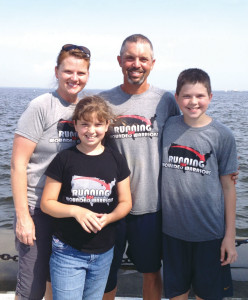
On March 26, 2012, Summerlin put those months of training to work. He stuck his feet in the Pacific Ocean in Oregon’s Coos Bay and took off on a 100-day adventure that changed his life. While his family was skeptical in the beginning, their support was unwavering as he logged mile after mile on his freedom run. His wife and kids followed him in an RV, and they were joined by other family members, like his mother and mother-in-law, along the way. “It was an experience I never could have accomplished without my wife and family,” he says. “Tiffany was my physical therapist, massage therapist, nutritionist and my rock. She cheered me up when I needed it while still making time to be a great mother to our kids. I always say I had the easiest part of the journey. All I had to do was eat, sleep and run. She had to feed me, drive the RV, take care of the kids and help them with their school work while I just focused on putting one foot in front of the other. It took time to get everyone to buy in and believe, but once they did, it was amazing.”
Summerlin ran for 100 days from Oregon to Delaware, capping off his journey with a 100-mile run in less than 24 hours from Annapolis, MD, to Rehoboth Beach, DE—a personal best. In total, he ran 3,452 miles through 16 states and Washington, DC. While the experience is one he will never forget, what he remembers most are the veterans he met along the way and their stories and struggles. “I got to see the country at five miles an hour, one hour at a time,” he says. “I got to see America like most people never have, but for me it was mostly about supporting my brothers and sisters and a desire to take care of the large population of veterans who need assistance.”
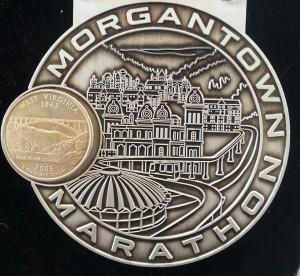
Morgantown Marathon
A little thing like running across the country hasn’t slowed Summerlin down. Since Freedom Run USA, he has published a book documenting his experiences and planned the first-ever Morgantown Marathon, which took place in September 2015. “I have run all over the East Coast, and I thought, ‘Why don’t we have a race in our own backyard?’ We have a beautiful city here in Morgantown, and we need to tear down the stigmas about West Virginia and show it off.”
In 2014, Summerlin began making contacts to garner community support for a marathon in Morgantown. “We partnered with the Greater Morgantown Convention and Visitors Bureau, which became our full marathon sponsor, and then WVU Medicine joined in,” he says. “Soon, tons of businesses and organizations were coming onboard, and I believed this was actually going to happen.”
The course started and ended at the WVU Coliseum and went through all seven wards of the city to showcase Morgantown, including Krepps Park, College Avenue, High Street, South Park, Sabraton, White Park and Greenbag Road. “The beauty of it was that people came to run this race, and they were so excited to be part of an inaugural event,” says Summerlin. “The slogan was ‘26.2 Almost Heavenly Miles’ because we were truly showcasing the beauty of West Virginia. You can find a flat, fast marathon on any weekend in this country, but many people want a challenge. This run wasn’t easy, and people really liked walking away with a sense of accomplishment.”
The race had more than 1,200 registered runners, 40 percent of which were from out of state, and there were 500 community volunteers, ranging from law enforcement and city officials to WVU students and organizations. The event raised $65,000 for OWH, which has put 100 veterans back to full-time work in the past three years. “It turned out better than anyone else ever expected, but I knew it would be a success,” says Summerlin. “People were blown away by the donations. West Virginians have a desire to take better care of their veterans because we take care of each other anyway. I think it was very important to promote what the money was for and to make a big deal out of that presentation. I wanted people to know what we said we were going to do is what we did.”
Operation Welcome Home
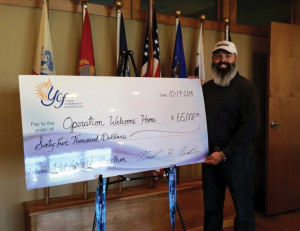
Summerlin’s run and the Morgantown Marathon both benefited OWH because it is an organization he truly believes in. “West Virginia has per capita the most veterans of any state in the nation, and that speaks to a few things, including a long history of service in this state,” he says.
According to him, West Virginia has many organizations that try to fill the gap for veterans’ needs, but often the biggest challenge is getting veterans through the doors due to the negative stigma associated with asking for help. “There is an attitude of ‘I’m a tough guy, and I don’t need help’—especially among younger guys coming back home now,” he says. “They’re afraid to reach out for help. OWH offers a support system that helps veterans get back on their feet and back to work.”
As the spokesperson and CEO of OWH in name only, Summerlin chooses the non-paid status because the organization’s sole purpose is to find jobs for veterans. It has one full-time employee, Program Manager Brett Simpson, who works with hiring agencies to develop relationships. According to Summerlin, what sets OWH apart is that veterans come and spend time at their lodge-style office to connect with one another, which allows the staff to get to know them and have a good sense of what type of position would suit them best. They can then be matched with the best employer to set them up for success. “A lot of what we do is just reconnecting vets so they can be a support system for each other,” he says.
Summerlin is currently speaking to school groups, veteran organizations and health care communities about his run to encourage more support for OWH. “The beauty of the story about my run is that I got a chance to meet vets along the way, hear their stories and the challenges they’re facing and encourage and support them,” he says. “I can adjust that message to just about any group because it’s all about finding your passion and purpose, figuring out what you’re good at and using that to inspire others to greatness. That’s what I try to do. I want to keep sharing my story so that others know one person really can make a difference.”








